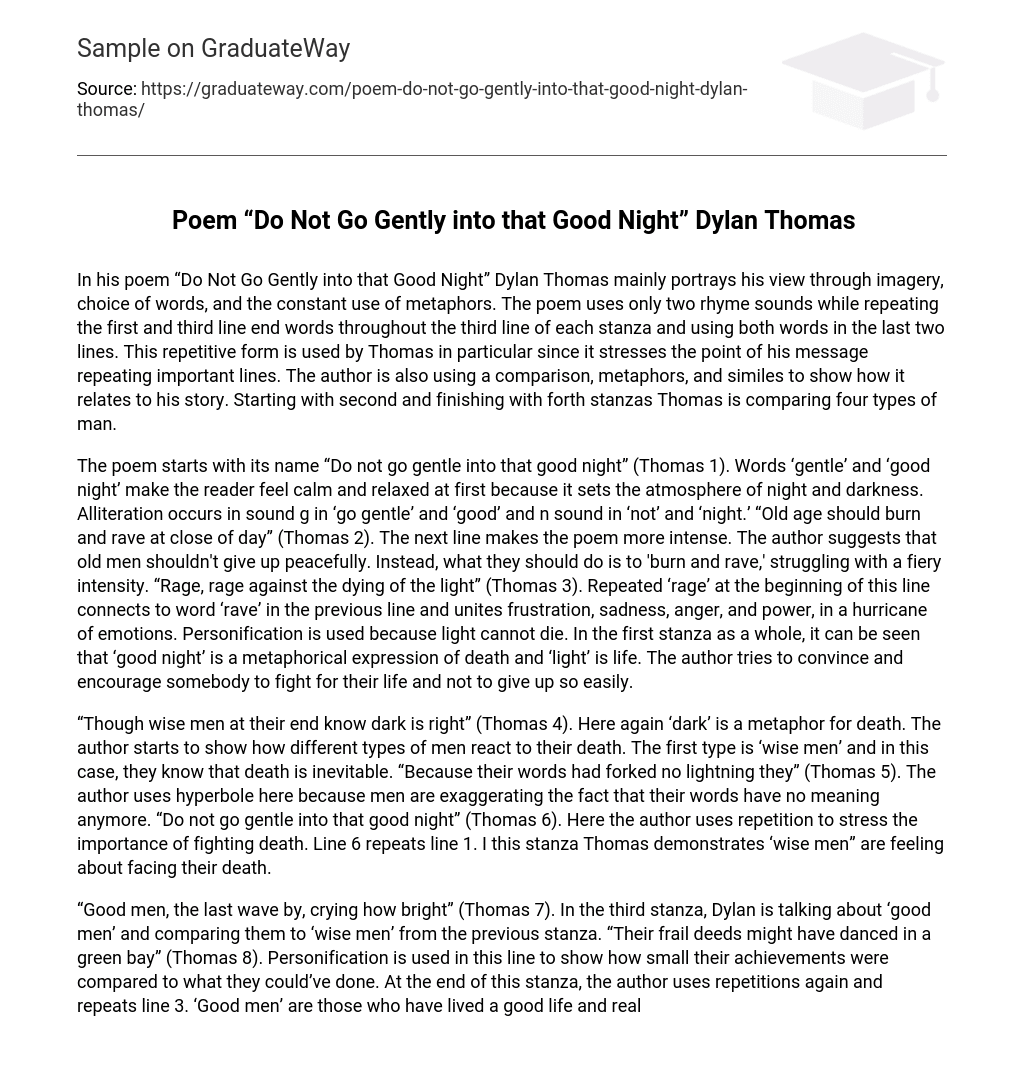In his poem “Do Not Go Gently into that Good Night” Dylan Thomas mainly portrays his view through imagery, choice of words, and the constant use of metaphors. The poem uses only two rhyme sounds while repeating the first and third line end words throughout the third line of each stanza and using both words in the last two lines. This repetitive form is used by Thomas in particular since it stresses the point of his message repeating important lines. The author is also using a comparison, metaphors, and similes to show how it relates to his story. Starting with second and finishing with forth stanzas Thomas is comparing four types of man.
The poem starts with its name “Do not go gentle into that good night” (Thomas 1). Words ‘gentle’ and ‘good night’ make the reader feel calm and relaxed at first because it sets the atmosphere of night and darkness. Alliteration occurs in sound g in ‘go gentle’ and ‘good’ and n sound in ‘not’ and ‘night.’ “Old age should burn and rave at close of day” (Thomas 2). The next line makes the poem more intense. The author suggests that old men shouldn’t give up peacefully. Instead, what they should do is to ‘burn and rave,’ struggling with a fiery intensity. “Rage, rage against the dying of the light” (Thomas 3). Repeated ‘rage’ at the beginning of this line connects to word ‘rave’ in the previous line and unites frustration, sadness, anger, and power, in a hurricane of emotions. Personification is used because light cannot die. In the first stanza as a whole, it can be seen that ‘good night’ is a metaphorical expression of death and ‘light’ is life. The author tries to convince and encourage somebody to fight for their life and not to give up so easily.
“Though wise men at their end know dark is right” (Thomas 4). Here again ‘dark’ is a metaphor for death. The author starts to show how different types of men react to their death. The first type is ‘wise men’ and in this case, they know that death is inevitable. “Because their words had forked no lightning they” (Thomas 5). The author uses hyperbole here because men are exaggerating the fact that their words have no meaning anymore. “Do not go gentle into that good night” (Thomas 6). Here the author uses repetition to stress the importance of fighting death. Line 6 repeats line 1. I this stanza Thomas demonstrates ‘wise men” are feeling about facing their death.
“Good men, the last wave by, crying how bright” (Thomas 7). In the third stanza, Dylan is talking about ‘good men’ and comparing them to ‘wise men’ from the previous stanza. “Their frail deeds might have danced in a green bay” (Thomas 8). Personification is used in this line to show how small their achievements were compared to what they could’ve done. At the end of this stanza, the author uses repetitions again and repeats line 3. ‘Good men’ are those who have lived a good life and realized towards the end that they could have done so much more. Just like ‘good’ and ‘wise’ men both resist dying peacefully, because they could not achieve what they might have achieved in their lives. If they really want to achieve anything in life, they also have to fight death.
The fourth stanza begins by introducing the third type of men. “Wild men who caught and sang the sun in flight” (Thomas 10). These are men who spent their time in selfish enjoyment. Here imagery is used by appealing to readers hearing and vision and metaphor by sun representing life. “And learn, too late, they grieved it on its way” (Thomas 11). Alliteration occurs in sound l ‘ learned’ and ‘late’. These men understood that they wasted their lives, but it was too late. Line 12 repeats line 6 for the same reason as before. Once again a contrast between ‘the sun’ and ‘night’ is shown in this stanza.
In the fifth stanza, Thomas introduces the last type of men. “Grave men, near death, who see with blinding sight” (Thomas 13). Words ‘grave’, ‘death’ and ‘blinding’ set a more intense mood for the poem. “Blind eyes could blaze like meteors and be gay” (Thomas 14). A simile is used by implying that these men instead of giving up, they can ‘blaze like meteors’ and still can use the strength that they have to rage against death. Imagery is used as well, it deepens the reader’s understanding. Line 3 is repeated again. This stanza showed that even ‘grave men’ are still fighting for their life. In the last stanza, the author addresses his dying father. “And you, my father, there on the sad height” (Thomas 16).





